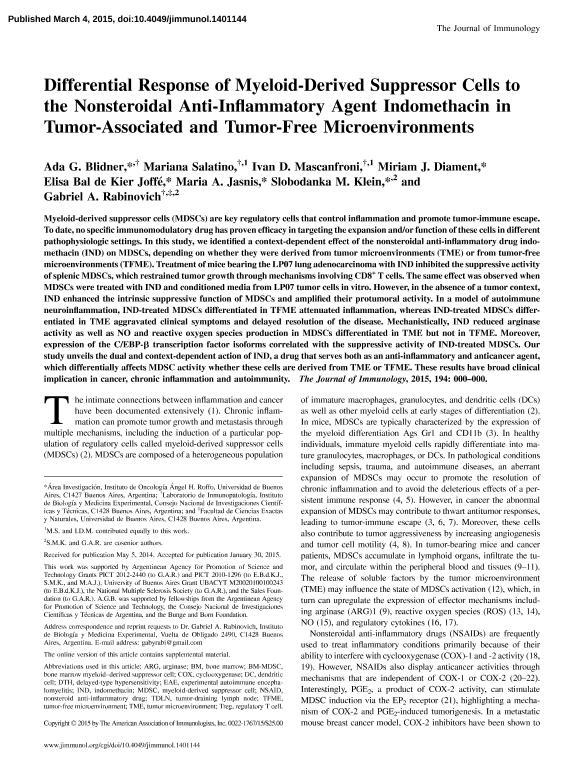Artículo
Differential response of myeloid-derived suppressor cells to the nonsteroidal anti-inflammatory agent indomethacin in tumor-associated and tumor-free microenvironments
Blidner, Ada Gabriela ; Salatino, Mariana
; Salatino, Mariana ; Mascanfroni, Ivan Darío
; Mascanfroni, Ivan Darío ; Diament, Miriam; Bal, Elisa Dora
; Diament, Miriam; Bal, Elisa Dora ; Maria A. Jasnis; Slobodanka M. Klein; Rabinovich, Gabriel Adrián
; Maria A. Jasnis; Slobodanka M. Klein; Rabinovich, Gabriel Adrián
 ; Salatino, Mariana
; Salatino, Mariana ; Mascanfroni, Ivan Darío
; Mascanfroni, Ivan Darío ; Diament, Miriam; Bal, Elisa Dora
; Diament, Miriam; Bal, Elisa Dora ; Maria A. Jasnis; Slobodanka M. Klein; Rabinovich, Gabriel Adrián
; Maria A. Jasnis; Slobodanka M. Klein; Rabinovich, Gabriel Adrián
Fecha de publicación:
01/04/2015
Editorial:
American Association of Immunologists
Revista:
Journal of Immunology
ISSN:
0022-1767
Idioma:
Inglés
Tipo de recurso:
Artículo publicado
Clasificación temática:
Resumen
Myeloid-derived suppressor cells (MDSCs) are key regulatory cells that control inflammation and promote tumor-immune escape. To date, no specific immunomodulatory drug has proven efficacy in targeting the expansion and/or function of these cells in different pathophysiologic settings. In this study, we identified a context-dependent effect of the nonsteroidal anti-inflammatory drug indomethacin (IND) on MDSCs, depending on whether they were derived from tumor microenvironments (TME) or from tumor-free microenvironments (TFME). Treatment of mice bearing the LP07 lung adenocarcinoma with IND inhibited the suppressive activity of splenic MDSCs, which restrained tumor growth through mechanisms involving CD8(+) T cells. The same effect was observed when MDSCs were treated with IND and conditioned media from LP07 tumor cells in vitro. However, in the absence of a tumor context, IND enhanced the intrinsic suppressive function of MDSCs and amplified their protumoral activity. In a model of autoimmune neuroinflammation, IND-treated MDSCs differentiated in TFME attenuated inflammation, whereas IND-treated MDSCs differentiated in TME aggravated clinical symptoms and delayed resolution of the disease. Mechanistically, IND reduced arginase activity as well as NO and reactive oxygen species production in MDSCs differentiated in TME but not in TFME. Moreover, expression of the C/EBP-â transcription factor isoforms correlated with the suppressive activity of IND-treated MDSCs. Our study unveils the dual and context-dependent action of IND, a drug that serves both as an anti-inflammatory and anticancer agent, which differentially affects MDSC activity whether these cells are derived from TME or TFME. These results have broad clinical implication in cancer, chronic inflammation and autoimmunity
Palabras clave:
Mdsc
,
Indometacin
,
Lung Cancer Cells
,
Tumor Microenvironment
Archivos asociados
Licencia
Identificadores
Colecciones
Articulos(IBYME)
Articulos de INST.DE BIOLOGIA Y MEDICINA EXPERIMENTAL (I)
Articulos de INST.DE BIOLOGIA Y MEDICINA EXPERIMENTAL (I)
Articulos(OCA HOUSSAY)
Articulos de OFICINA DE COORDINACION ADMINISTRATIVA HOUSSAY
Articulos de OFICINA DE COORDINACION ADMINISTRATIVA HOUSSAY
Citación
Blidner, Ada Gabriela; Salatino, Mariana; Mascanfroni, Ivan Darío; Diament, Miriam; Bal, Elisa Dora; et al.; Differential response of myeloid-derived suppressor cells to the nonsteroidal anti-inflammatory agent indomethacin in tumor-associated and tumor-free microenvironments; American Association of Immunologists; Journal of Immunology; 194; 7; 1-4-2015; 3452-3462
Compartir
Altmétricas



